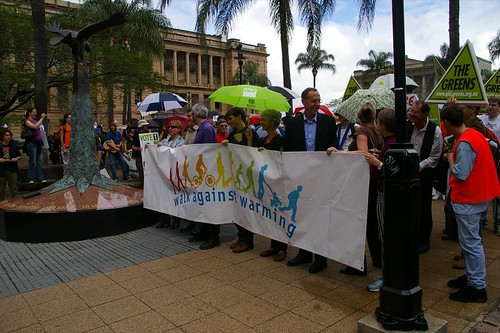I was talking to a Democrat candidate yesterday at our Walk for Sustainable Transport (Australia is having a federal election later this year). He discussed paying registration and insurance on a pay-as-you-drive basis. This would necessarily need to include a carbon tax aswell. It would have to be adjusted for different locations since city people would tend to be more involved in conjestion and city people have the choice of public transport whilst rural people do not. This will make it more complex but more anonymous also. This EU plan is better since it automates the charge and thus reduces the complexity, however it is very imposing with the system requiring that the location of the user be monitored. Of course the solution to not being monitored is to catch public transport, which is what this system is trying to "encourage"!
Feb 14, 2007
From Epoch Times (UK).
nvironmental campaigners in Britain have urged the government to not be bowed over by a campaign against road pricing proposals.
The new pay-as-you-drive tax has been challenged by a campaign led by the motoring lobby and a number of national newspapers. At the time of writing, there were 1,299,495 signatures in an e-petition on the Downing Street website.
The tax was initially proposed to counter congestion on roads but environmental campaigners stress that that the tax may also cut car emissions, by discouraging more people from driving.
"Road pricing is not a magic bullet solution to Britain's transport problems, but it is part of the answer," said Tony Bosworth, Friends of the Earth's Senior Transport Campaigner. "The biggest transport problem we face is not congestion, it is climate change."
Twenty per cent of yearly national emissions come from cars. Campaigners hope that by raising the cost of motoring, more people will be encouraged to travel by public transport.
Under Labour, the cost of motoring fell by eight per cent between 1997 and 2005, but bus and train fares have risen.Carbon dioxide emissions have risen by nearly seven per cent in the same period.
Motoring groups say that owing to the state of the public transport system people have little choice but to travel in cars.
"We have had 15 years of negative transport policy," said the Association of British Driver's Policy Director Mark Mc-Arthur Christie. "It's all been about bashing the motorist without offering any real alternative."
If the government do not bow to pressure over the scheme it will likely be implemented in a decade. But Friends of the Earth are lobbying the government to invest more in public transport and safer cycle paths now to provide viable alternatives to car use in the meantime.
Under the government's proposals, a black box will be fitted to vehicles, enabling satellites to be pinpoint them on Britain's road system. People will then be charged for the distance they have travelled. It is thought that the Galileo satellite receiver may also be able to monitor speed and whether drivers are violating any other traffic regulations.
"Road charging will be levied at its highest on the most congested roads," said Mark McArthur Christie. "It will be impossible for drivers to know if a road is congested until they are on it, sitting in a traffic jam with no escape route whilst the black box in their car clocks up pound signs for the chancellor.
"Many will not wish to take the risk and will of course seek alternative routes. Unfortunately for villagers and users of quiet country lanes, these will very often be the routes they seek out, causing a massive increase in traffic levels."
Shadow Home Secretary David Davis has voiced concerns that the new scheme would open the gates for a "Big Brother" surveillance society. "There are very real concerns that the road pricing model that the Government is looking at will allow routine surveillance of every citizen in the country... Clearly that is not acceptable," he said.
Campaigners claim the scheme will have the same successes as the initially controversial congestion charge in London, which has significantly reduced traffic in the city centre and persuaded more people to use public transport.
"The government must make the case for road pricing's role in tackling congestion and climate change," said Tony Bosworth. "Without road pricing, traffic levels will rise, congestion will get worse, and transport's contribution to climate change will continue to grow.
"Opponents of road pricing should explain what they would do instead. Building roads and widening motorways is not the answer."
Motoring groups point out that the tax will most probably be regressive like in London, that is, levied without respect for the ability of drivers to pay. This, coupled with taxes on fuel that are already the highest in Europe, they say will have the effect of pricing the poor off the road.
"It seems to me that we already have a perfectly fair system of road pricing which is fuel tax," said motoring TV presenter and pundit Jeremy Clarkson to the BBC.
Read the article.





1 comment:
The e-petition is now at almost at 1.6m, but the government will politely refuse its demand to scrap vehicle tracking plans when it closes on 20 February. This is partly because the petition is innacurate. There are currently no plans in place: the government is funding the initial stages of pilot schemes for road pricing. It is also because many people in Britain support road pricing. Despite the huge number of signatories, the petition only reflects one interest group.
Post a Comment